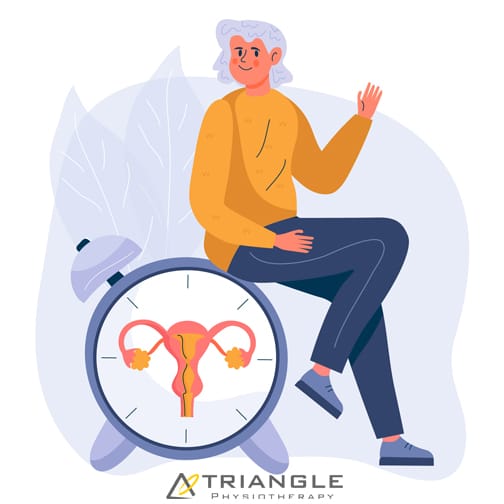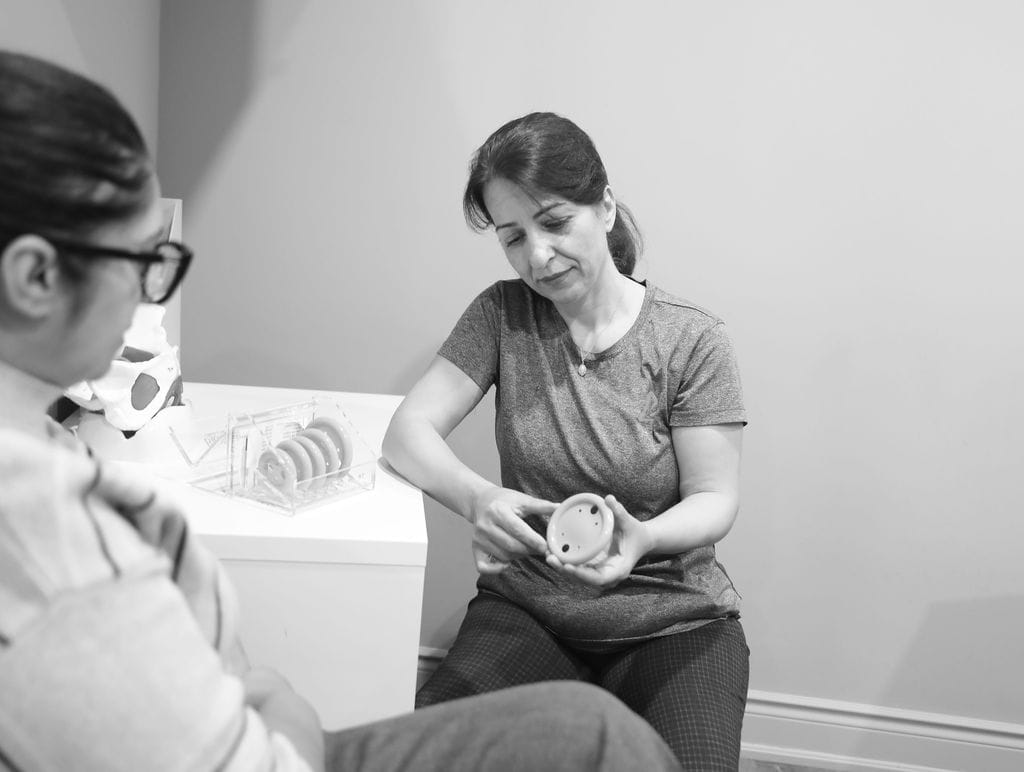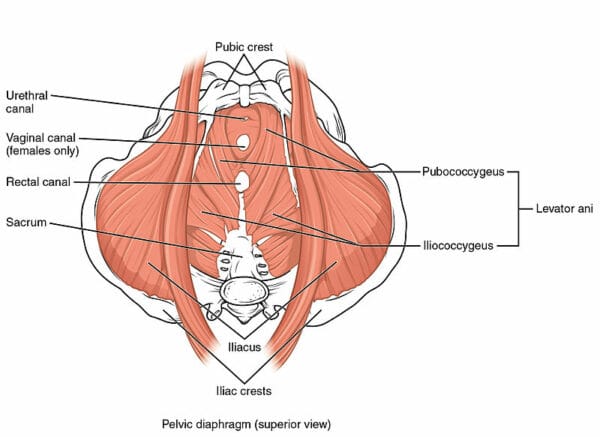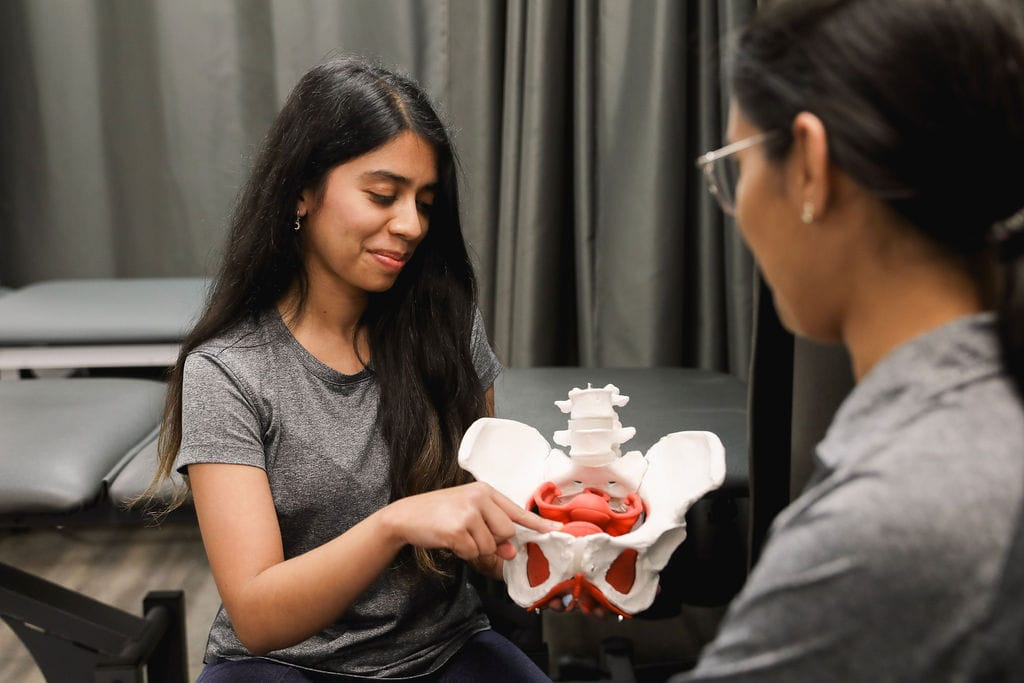What to expect and how to feel empowered from day one
When it comes to pelvic health, there’s often a mix of curiosity, concern, and even confusion – especially if you’ve never seen a pelvic physiotherapist before. Whether you’re navigating postpartum recovery, persistent discomfort, or changes with age, know this: you’re not alone, and help is closer than you think.
At Triangle Physiotherapy North York, we know that walking into your first pelvic physiotherapy appointment can feel like a big step. That’s why we’ve created a safe, welcoming environment where education and empathy come first.
Here’s what to expect – plus some helpful prep tips so you can feel confident and informed ahead of your first visit.
What Is Pelvic Physiotherapy?
Pelvic physiotherapy focuses on the muscles, ligaments, and connective tissues that support the bladder, uterus (or prostate), and bowel. When these structures are weak, tight, or not working in coordination, it can lead to issues like:
- Bladder leaks or urgency
- Pain during sex
- Constipation
- Pelvic or lower back pain
- Heaviness or pressure in the pelvic region
- Discomfort during movement or exercise
Pelvic physiotherapy in North York is designed to assess and treat these concerns through a combination of hands-on therapy, targeted exercises, posture training, and patient education.
What Happens at Your First Appointment?

Your first session at Triangle Physiotherapy North York will feel a lot like a detailed conversation mixed with gentle movement-based assessment.
Here’s a breakdown of what to expect:
- History & Concerns: We start with your story. This includes your symptoms, medical background, lifestyle habits, and any previous injuries or surgeries.
- Education & Consent: We explain how the pelvic floor functions and what could be contributing to your symptoms. If an internal assessment is helpful, it’s discussed with complete transparency and only done with your full, informed consent.
- Movement & Posture Check: You may be asked to walk, squat, or move in certain ways so we can observe muscle coordination and alignment.
- Personalized Plan: Based on your needs, we build a care plan with treatment goals, exercises, and follow-up recommendations.
The goal? Helping you feel heard, informed, and never rushed. You’re in charge of your journey – we’re simply your support team.
Tips Before You Arrive
- Wear comfy clothes that let you move freely
- Bring a list of symptoms, questions, or goals
- Come with an open mind – pelvic physio is often gentler and more holistic than people expect
Why Triangle Physiotherapy North York?
We take pride in being a trusted name for pelvic physiotherapy in North York, with an emphasis on:
- Respectful, patient-centered care
- Highly trained pelvic health therapists
- Private, one-on-one sessions
- Flexible scheduling and direct billing options
- A clinic culture that prioritizes comfort, dignity, and real progress
Your First Step Starts Here
Taking care of your pelvic health is nothing to be shy about – it’s an important part of your well-being. Whether you’re experiencing symptoms or just want to better understand your body, we’re here to help.
Book your initial pelvic physiotherapy session at Triangle Physiotherapy North York today. Your comfort, confidence, and health matter here.
Because healing doesn’t end after delivery
Bringing a new life into the world is no small feat – and neither is the recovery that follows. While many focus on the baby’s well-being (rightfully so!), new moms often put their own healing on the backburner. But those aches, leaks, or feelings of pressure after childbirth? They’re signals that your body needs care too.
At Triangle Physiotherapy North York, we specialize in postpartum pelvic physiotherapy to help you recover in a way that’s safe, informed, and empowering – no matter what kind of birth you had.
What Happens to the Pelvic Floor After Birth?
During pregnancy and delivery, your pelvic floor muscles go through a lot. These muscles support your bladder, uterus, and bowel – and during childbirth, they stretch, strain, and in some cases, tear.
It’s completely normal to feel different after giving birth. But “common” doesn’t mean “should be ignored.”
Signs your pelvic floor needs attention may include:
- Leaking when you laugh, cough, or run
- Pain or discomfort during intimacy
- A heavy or dragging sensation in your pelvis
- Ab separation (diastasis recti)
- Trouble regaining core strength
- Lower back or hip pain
If you’re experiencing any of these, know that postpartum pelvic physiotherapy in North York can help you feel stronger, more comfortable, and more confident in your body again.
How Physiotherapy Helps with Postpartum Recovery

At Triangle Physiotherapy North York, we create personalized recovery plans tailored to your birth experience, current symptoms, and future goals – whether that’s lifting your baby pain-free or getting back to your workout routine.
Here’s how we support your healing:
- Pelvic floor rehab: Gentle techniques to restore muscle tone, function, and coordination
- Core reconditioning: Safe exercises to reconnect with your deep abdominal muscles and rebuild stability
- Breathing & posture work: Learn how daily movements and habits affect your recovery
- Manual therapy: Hands-on treatment for scars, tightness, or alignment issues
- Education: We explain what’s happening in your body, so you feel confident and in control
It’s not about “bouncing back” – it’s about building forward, with guidance and care.
Why Choose Triangle Physiotherapy North York?
Postpartum healing looks different for everyone. Our team understands the physical and emotional aspects of recovery, and we’re here to walk with you every step of the way.
Here’s what you’ll get with us:
- Experienced pelvic health physiotherapists trained in postpartum care
- Private, one-on-one sessions designed around your comfort and pace
- Flexible scheduling including evening and weekend appointments
- Direct billing to most insurance providers
- A focus on realistic, long-term recovery – not pressure to “snap back”
We’re proud to be a trusted provider of postpartum pelvic physiotherapy in North York, helping new moms feel stronger, supported, and empowered.
Ready to Focus on You?
You deserve time to heal, support that understands, and a recovery plan that puts you first. Let’s get you back to feeling like yourself – with a little extra strength for chasing after that new bundle of joy.
Book your postpartum pelvic assessment today at Triangle Physiotherapy North York. We’re here for your recovery, your questions, and your next chapter.
Triangle Physiotherapy in Mississauga is a full-service clinic that offers specialized services like Pelvic Health Physiotherapy. Our pelvic health physiotherapists are trained professionals who, apart from being experts in their field, are also empathetic individuals who understand the sensitive nature of the conditions that make people seek pelvic health physiotherapy.
Tell me more about your Mississauga Pelvic Health physiotherapists.

Our Mississauga Pelvic Health physiotherapists have training in the field of pelvic health physiotherapy and are committed to providing the best care to the community in Mississauga, be it new moms, women with prolapse or incontinence issues, pessary fittings, labour and delivery support, and more. We also have a pelvic health physiotherapist who is trained to help children. Our pelvic health physiotherapists are also able to help men with their pelvic health issues.
What type of conditions can a pelvic floor physiotherapist treat?
Some of the conditions treated by our Mississauga Pelvic Health physiotherapists are:
- Incontinence (urinary and fecal)
- Pelvic organ prolapse and pessary fittings
- Constipation
- Diastasis recti
- Vaginismus
- Pelvic pain
- Pelvic girdle pain during pregnancy and postpartum)
- Coccydynia (tailbone pain)
- Pudendal neuralgia
- Interstitial cystitis
- Female and Male Sexual dysfunction
- Prostatitis
- Rectal pain and dysfunction
- Irritable bowel syndrome
- Anal incontinence
- Anal fissures and fistulas
- Anal neuralgia
- Rectal prolapse
I just gave birth recently. How soon should I see a pelvic health physiotherapist
The pelvic floor muscles may get stretched or damaged during delivery, whether by C-Section or vaginal. This may cause issues of the pelvic floor that manifest as urinary or fecal incontinence, urinary urgency or frequency, pain during sexual activity, pelvic organ prolapse, pelvic pain, lower back pain, diastasis recti, or scar pain. Many of these issues can be addresed by pelvic health physiotherapy, however, our pelvic physiotherapists in Mississauga recommend waiting at least six weeks after delivery to allow the body time to heal from childbirth.
Can I speak to a pelvic health physiotherapist in Mississauga prior to booking a consultation?
We can certainly connect you with the best pelvic floor physiotherapist in Mississauga that can answer any questions you may have. Click here to book a discovery call.
Where can I find a pelvic health physiotherapist in Mississauga?
We have 8 locations with pelvic health physiotherapists to help you.
- Pelvic Health Physiotherapy Etobicoke – Triangle Physiotherapy Etobicoke
- Oakville Pelvic Health – Triangle Physiotherapy Oakville
- Pelvic Health Physiotherapy North York – Triangle Physiotherapy North York
- Mississauga Pelvic Health – Triangle Physiotherapy Mississauga
- Downtown Pelvic Health – Triangle Physiotherapy King West
- Uptown Toronto Pelvic Health – Triangle Physiotherapy Lawrence Park
- Pelvic Physiotherapy Downtown Toronto – Triangle Physiotherapy Queens Quay
- Mississauga Pelvic Health – Triangle Physiotherapy Erin Mills
“Finding the right pelvic health physiotherapist is crucial for effective treatment and recovery. Triangle Physiotherapy offers expert care across the GTA, including Physiotherapy in Etobicoke, Oakville, North York, Toronto, Lawrence Park, Queens Quay, Erin Mills, Mississauga, and Liberty Village. Our skilled physiotherapists specialize in pelvic health, providing personalized treatment plans to help you achieve the best possible outcomes.”
Menopause can be a very overwhelming time for a lot of women. During this period, there are a lot of hormonal changes that can influence the way you feel in your body. Menopause tends to start between the ages of 45 to 55. This can include a range of symptoms such as hot flashes and mood swings to vaginal dryness and changes in pelvic health.

How does Menopause affect pelvic health?
Many women don’t realize that menopause can affect pelvic health. As estrogen levels decline, tissues in the vagina, urethra, and bladder can become thinner, drier, and less elastic, leading to a condition called vaginal atrophy. This can cause uncomfortable symptoms such as vaginal dryness, itching, burning, and pain during sex. In addition, menopause can also increase the risk of pelvic floor disorders, such as incontinence and prolapse. But don’t worry, many of these conditions can be improved through pelvic physiotherapy!
What is pelvic floor physiotherapy?
Pelvic floor physiotherapy is a specialized form of physiotherapy that focuses on the pelvic floor muscles, which support the pelvic organs (bladder, uterus, and rectum) and control bladder and bowel function. Pelvic physiotherapy can help to improve pelvic health during menopause and beyond, providing relief from uncomfortable symptoms and reducing the risk of pelvic floor disorders.
What does Pelvic Health Physiotherapy Involve?
Pelvic floor physiotherapy involves a range of techniques designed to improve the strength, coordination, and function of the pelvic floor muscles. These techniques may include pelvic floor exercises, biofeedback, electrical stimulation, manual therapy, and education on lifestyle modifications. It is an effective alternative to drug based therapy and surgery, and allows for you to take your health into your own hands.
How Can Pelvic Physiotherapy Help During Menopause?
- Pelvic physiotherapy can help to address a range of pelvic health issues that can arise during menopause, including:
- Vaginal Dryness: Pelvic physiotherapy can help to improve blood flow to the vaginal area, which can increase lubrication and reduce discomfort during intercourse. Additionally, exercises to strengthen the pelvic floor muscles can help to improve vaginal tone and elasticity.
- Urinary Incontinence: Pelvic physiotherapy can help to strengthen the pelvic floor muscles that support the bladder, which can improve bladder control and reduce urinary incontinence.
- Prolapse: Pelvic physiotherapy can help with prolapse symptoms or post-hysterectomy. With a prolapse, there is commonly increased muscle tone causing the organ to descend. This can be improved with exercise and treatment. Post hysterectomy, there can be pelvic floor weakness or altered sensation internally which can also be treated through strengthening and sensitization work.
- Painful Intercourse: Pelvic physiotherapy can help to improve vaginal tone and elasticity, which can reduce pain and discomfort during intercourse.
How can I find a pelvic health physiotherapist near me?
We have 8 locations with pelvic health physiotherapists to help you.
- Pelvic Health Physiotherapy Etobicoke – Triangle Physiotherapy Etobicoke
- Oakville Pelvic Health – Triangle Physiotherapy Oakville
- Pelvic Health Physiotherapy North York – Triangle Physiotherapy North York
- Mississauga Pelvic Health – Triangle Physiotherapy Mississauga
- Downtown Pelvic Health – Triangle Physiotherapy King West
- Uptown Toronto Pelvic Health – Triangle Physiotherapy Lawrence Park
- Pelvic Physiotherapy Downtown Toronto – Triangle Physiotherapy Queens Quay
- Mississauga Pelvic Health – Triangle Physiotherapy Erin Mills
“While menopause symptoms can be challenging, they are not inevitable for everyone and can be managed with the right care. Triangle Physiotherapy offers specialized services to help you navigate this stage of life across the GTA, including Physiotherapy in Etobicoke, Oakville, North York, Toronto, Lawrence Park, Queens Quay, Erin Mills, Mississauga, and Liberty Village. Our experienced team can provide personalized treatment plans to alleviate symptoms and improve your quality of life.”
What is vaginismus?
Vaginismus is a condition where the muscles around the vagina involuntarily contract, making it difficult or impossible to have vaginal penetration.
Do I have vaginismus?
If you answer yes to one or more of the following questions, you must book an appointment with a pelvic health physiotherapist to find out if you have vaginismus.
“Sex is so uncomfortable for me.”
“Why does it hurt to have sex? My doctor cannot find anything wrong with me.”
“Internal pelvic exams are a no for me – they are so painful.”
“My vagina feels like a fort that is impenetrable. I never realized it was vaginismus.”
“I used to have great sex, but now I close up—it burns and stings.”
“When my partner starts to move inside me, it hurts and we have to stop.”
“I don’t wear tampons because they don’t go in.”
What are the symptoms of vaginismus?
The symptoms may differ between younger and older women, emphasizing the significance of an accurate diagnosis and effective treatment for vaginismus.
The primary symptoms of vaginismus are:
- Sexual penetration seems physically impossible despite repeated attempts
- Difficulty inserting tampons from youth even after repeated attempts.
- Difficulty undergoing internal pelvic/gynecological exam
What are the causes of Vaginismus?

The exact causes of vaginismus can vary from person to person, and in many cases, the condition is multifactorial, meaning that multiple factors may contribute to its development. Here are some potential causes and contributing factors:
- Psychological factors: Emotional or psychological factors can play a significant role in vaginismus. Past traumatic experiences, such as sexual abuse, rape, or a history of painful intercourse, can contribute to the development of vaginismus. Anxiety, fear, guilt, or negative beliefs about sex can also trigger involuntary muscle contractions.
- Fear of pain or discomfort: Some individuals may develop vaginismus due to a fear of pain or discomfort during sexual intercourse. This fear can be based on previous painful experiences, cultural or religious beliefs, or misinformation about sex.
- Relationship issues: Difficulties in the relationship, such as poor communication, lack of trust, unresolved conflicts, or sexual problems, can contribute to the development or persistence of vaginismus. Emotional or physical distance between partners can create tension and anxiety during sexual activity.
- Cultural or religious factors: Cultural or religious beliefs and practices surrounding sex can influence a person’s perception of sexuality and contribute to the development of vaginismus. Upbringing that emphasizes guilt, shame, or negative attitudes towards sex can lead to involuntary muscle contractions during attempts at vaginal penetration.
- Lack of sexual education: Insufficient knowledge or understanding about sexual anatomy, arousal, and relaxation techniques can contribute to vaginismus. Inadequate sexual education may lead to misconceptions, anxiety, and fear surrounding sexual activity.
- Medical conditions or infections: Certain medical conditions, such as vaginal infections, urinary tract infections, endometriosis, or pelvic inflammatory disease, can cause pain during sex, leading to the development of vaginismus. Vaginal dryness or atrophy, often associated with menopause, can also contribute to discomfort and muscle tightness.
- Traumatic childbirth experiences: Some women may develop vaginismus after experiencing a traumatic childbirth, especially if they had a difficult or painful delivery. The association of vaginal penetration with the traumatic event can trigger involuntary muscle contractions.
What are the treatment options for vaginismus?
Pelvic health physiotherapy is a common treatment option for vaginismus. It involves a physical therapist working with the patient to help relax and strengthen the pelvic floor muscles.
Possible treatments include:
- Progressive pelvic floor muscle relaxation
- Biofeedback or muscle stimulation
- Yoga-based therapy
- Hip mobility work
- Lumbar spine mobility work
What can I expect during an assessment and treatment for vaginismus at Triangle Physiotherapy?
Assessment
The first step in pelvic health physiotherapy for vaginismus is usually an assessment of the patient’s pelvic floor muscles. This may involve an internal examination, but the therapist will always seek the patient’s consent and respect their comfort level.
Treatment
Once the assessment is complete, the therapist will develop a treatment plan tailored to the patient’s needs. This may involve exercises to strengthen the pelvic floor muscles or techniques to help the patient relax those muscles.
Techniques
One common technique used in pelvic health physiotherapy for vaginismus is called progressive muscle relaxation. This involves tensing and then releasing the pelvic floor muscles in a controlled way to help the patient become more aware of them and learn how to control them.
Another technique that may be used is biofeedback. This involves using sensors to monitor the activity of the pelvic floor muscles, which can help the patient learn to control them more effectively.
Overall, pelvic health physiotherapy can be an effective treatment for vaginismus, but it is important to work with a qualified physical therapist who has experience in this area. With patience, persistence, and the right guidance, many people with vaginismus can overcome their condition and enjoy fulfilling sexual relationships.
How do I find a pelvic health physiotherapist near me?
We have 8 locations with pelvic health physiotherapists to help you. Book an Appointment today!
- Pelvic Health Physiotherapy Etobicoke – Triangle Physiotherapy Etobicoke
- Oakville Pelvic Health – Triangle Physiotherapy Oakville
- Pelvic Health Physiotherapy North York – Triangle Physiotherapy North York
- Mississauga Pelvic Health – Triangle Physiotherapy Mississauga
- Downtown Pelvic Health – Triangle Physiotherapy King West
- Uptown Toronto Pelvic Health – Triangle Physiotherapy Lawrence Park
- Pelvic Physiotherapy Downtown Toronto – Triangle Physiotherapy Queens Quay
- Mississauga Pelvic Health – Triangle Physiotherapy Erin Mills
“Managing vaginismus and improving intimacy is possible with the right physiotherapy care. Triangle Physiotherapy offers specialized pelvic health services across the GTA, including Physiotherapy in Etobicoke, Oakville, North York, Toronto, Lawrence Park, Queens Quay, Erin Mills, Mississauga, and Liberty Village. Our experienced physiotherapists can help you overcome pain and enhance your intimate relationships through personalized treatment plans.”
Written by Roshni Ravi, Pelvic Health Physiotherapist.
Sexual health is an important aspect of overall health and well-being, but it’s not always an easy topic to talk about. Many women experience sexual health dysfunctions at some point in their lives, but they may feel embarrassed or ashamed to seek help by way of pelvic floor physiotherapy. There are currently large gaps in the sexual education provided at the elementary school level. Many sex ed classes are focused on birth control and how terrible periods are.
But there is not enough information, if any, on sexual health conditions and how to seek help. We’ve had a lot of conversations with patients about what they wish they had learned in sex-ed. In this blog post, we’ll explore some of the most commonly asked questions about sexual health dysfunctions in women and offer some tips for managing them.
What is pelvic floor physiotherapy?

Pelvic floor physiotherapy focuses on treating the muscles, ligaments, and connective tissues of the pelvic floor which is a group of muscles that form a supportive hammock-like structure at the base of the pelvis. They play a key role in maintaining continence, supporting the pelvic organs, and providing stability to the spine and hips.
Pelvic floor physiotherapy involves a range of exercises, manual therapy techniques, and education to help individuals with pelvic floor dysfunction. Common conditions that may benefit from pelvic floor physiotherapy include:
- urinary and fecal incontinence,
- pelvic pain,
- pelvic organ prolapse, and
- sexual dysfunction.
Why am I suffering from a low libido? Can pelvic floor physiotherapy help?
Many women experience a decrease in sexual desire at some point in their lives. This can be caused by a variety of factors, including stress, hormonal imbalances, and relationship issues. To manage low libido, it’s important to address any underlying issues and make self-care a priority. This can include:
- practicing stress-management techniques,
- getting enough sleep, and
- engaging in regular exercise.
Why does it hurt to have sex?
Painful intercourse, also known as dyspareunia, is a common sexual health dysfunction in women. It can be caused by a variety of factors, including vaginal dryness, infections, and hormonal imbalances. To manage painful intercourse, it’s important to work with a healthcare provider to identify the underlying cause and develop a treatment plan. This may include using:
- lubricants,
- treating infections,
- or using hormonal therapy.
I struggle to orgasm during sex, why does that happen?
Many women struggle to achieve orgasm during sexual activity which can be caused by a variety of factors, including, stress, relationship issues, and hormonal imbalances. To manage orgasmic dysfunction, it’s important to work with a healthcare provider or therapist to address any underlying issues and develop strategies for improving sexual function. This may include:
- practicing mindfulness or
- engaging in self-exploration techniques.
My vagina feels like a fort that is impenetrable. Why can I not have sexual intercourse?
Vaginismus is a condition in which the muscles of the vaginal wall contract involuntarily, making intercourse difficult or impossible. It can be caused by a variety of factors, including past trauma and anxiety. To manage vaginismus, it’s important to work with a healthcare provider or therapist to address any underlying issues and develop strategies for managing anxiety and relaxing the pelvic floor muscles.
What is vulvodynia? Do I need pelvic floor physiotherapy?
Vulvodynia is a chronic pain condition that affects the vulva, or external genitalia. It can cause burning, stinging, or itching sensations, and can make sexual activity painful or uncomfortable. To manage vulvodynia, it’s important to work with a healthcare provider to identify the underlying cause and develop a treatment plan. This may include:
- using topical creams or medications,
- practicing relaxation techniques, or
- seeing a pelvic health physiotherapist.
Help! I pee my pants!

Urinary incontinence is a common condition in which urine leaks from the bladder involuntarily. It can be caused by a variety of factors, including hormonal changes, pregnancy, and pelvic floor dysfunction. To manage urinary incontinence, it’s important to work with a healthcare provider or pelvic floor physiotherapist to develop a treatment plan. This may include:
- pelvic floor exercises,
- bladder training, or
- medications.
What are the signs of menopause?
Menopause can cause a variety of changes in sexual function, including vaginal dryness, decreased libido, and painful intercourse. To manage these changes, it’s important to work with a healthcare provider to develop a treatment plan. This may include:
- using hormonal therapy,
- vaginal moisturizers, or
- engaging in regular sexual activity to maintain pelvic floor health.
Where can I find a pelvic health physiotherapist near me?
We have 8 locations with pelvic health physiotherapists to help you.
- Pelvic Health Physiotherapy Etobicoke – Triangle Physiotherapy Etobicoke
- Oakville Pelvic Health – Triangle Physiotherapy Oakville
- Pelvic Health Physiotherapy North York – Triangle Physiotherapy North York
- Mississauga Pelvic Health – Triangle Physiotherapy Mississauga
- Downtown Pelvic Health – Triangle Physiotherapy King West
- Uptown Toronto Pelvic Health – Triangle Physiotherapy Lawrence Park
- Pelvic Physiotherapy Downtown Toronto – Triangle Physiotherapy Queens Quay
- Mississauga Pelvic Health – Triangle Physiotherapy Erin Mills
In conclusion…
Many women experience sexual health dysfunctions at some point in their lives, but they may feel embarrassed or ashamed to seek help. It’s important to remember that sexual health is an important aspect of overall health and well-being, and it’s important to prioritize it in your self-care routine. If you’re experiencing any issues related to sexual function, don’t hesitate to talk to your healthcare provider or a therapist about your options. Remember, there is help!
Click here to book your consultation with one of our knowledgeable and compassionate pelvic health physiotherapists.
“Pelvic floor physiotherapy is essential for improving sexual health and overall well-being. Triangle Physiotherapy offers specialized pelvic health services across the GTA, including Physiotherapy in Etobicoke, Oakville, North York, Toronto, Lawrence Park, Queens Quay, Erin Mills, Mississauga, and Liberty Village. Our experienced team can help you address pelvic floor issues and enhance your sexual health through personalized treatment plans.”
Pelvic floor physiotherapy is a specialized form of physical therapy that focuses on the muscles, ligaments, and connective tissues of the pelvic floor. While both men and women have a pelvic floor, this form of therapy is particularly relevant for women due to specific concerns related to pregnancy, childbirth, and menopause.
Did you know:
- 1 in 5 women who have had a baby suffer from poor bladder and bowel control
- 1 in 2 experience pelvic organ prolapse
- 1 in 5 women suffer from pelvic or sexual pain
- Most physical activity will engage your Pelvic Floor Muscles
Also read, Physiotherapy Clinic in Etobicoke
Pelvic Floor Muscles

In order to better understand what happens in muscular dysfunction, it is important to first understand the normal function of these muscles, as well as other muscles that they work with. The Pelvic Floor Muscles are part of a group of muscles that are collectively referred to as your “core” muscles. This muscle group is composed of 4 distinct but linked group of muscles:
- Pelvic Floor Muscles
- Diaphragm
- Abdominal Muscles
- Lower Back Muscles
Also read, Physiotherapy Oakville
The Pelvic Floor muscle group is located at the base of the core. It is an important muscle group that works with the rest of the core to maintain pressure inside the torso when lifting heavy objects, coughing/sneezing or doing any other physical activity involving your lower back muscles. Some of the most important functions of the Pelvic Floor Muscles are:
- Maintaining control of the bowel and bladder in order to control leakage
- Holding up and supporting the bowel, bladder, and in the case of women, the uterus
- Playing an important role in sexual function
Pelvic Floor Muscles are located within the pelvic cavity and attach from the front to the pubic bone to the back to your tailbone or coccyx.
Also read, Physiotherapy treatment Mississauga
Pelvic Floor Dysfunctions in Women
For women, the Pelvic Floor holds additional importance as it is the group of muscles that handles enormous pressure during pregnancy. The ever-increasing weight of a child puts a strain on the pelvic muscles and the bladder, leading to frequent urination. As such, pelvic floor discomfort is quite common in women that are pregnant.
Advantages of Pelvic Physiotherapy for Women
Pelvic Floor Physiotherapy helps in the treatment and prevention of:
- Pelvic and bladder pain
- Painful intercourse
- Urinary leakage, frequency or urgency
- Post-pregnancy related problems
- Abdominal pain
What Do We Treat and How Do We Treat It?
At Triangle Physiotherapy, our Pelvic Health Physiotherapists can help treat:
- Vaginal Pain Syndrome (as a result of pelvic dysfunction)
- Pelvic Floor Dysfunction
- Pelvic Organ Prolapse
- Urinary Conditions
- And many more conditions!
Our assessments include:
- A thorough, 1-hour detailed history of your health issues, and specifically your pelvic issues
- A brief internal and external examination
Our treatments involve:
- Individualized treatment sessions that are 30 – 45 minutes in duration
- Generally, 4 – 8 treatments at a frequency of 1x/week* (varies from patient to patient) is recommended to best address your symptoms
If you’re a woman suffering from any of these conditions or are expecting a baby and would like to have healthy pelvic muscles, book an appointment today at any one of our 8 clinics in Etobicoke, Oakville, Mississauga (Square One), Mississauga (Erin Mills), North York, Toronto (King Street) Toronto (Queens Quay) and Toronto (Yonge Street).
Pelvic floor physiotherapy can significantly benefit women dealing with issues like incontinence, pelvic pain, and postpartum recovery. If you need specialized physiotherapy services, there are excellent clinics available in physiotherapy Etobicoke, Oakville, North York, Toronto, Lawrence Park, Queens Quay, Erin Mills, Mississauga, and Liberty Village. These locations offer expert care and tailored treatment plans to support women’s pelvic health and overall well-being.








